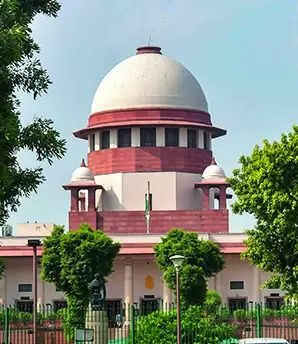Dhananjay.Mahapatra
New Delhi: The Supreme Court has ordered a comprehensive and periodic audit of 26 central and state bodies involved in environmental governance and said Constitution courts would continue to ensure these organisations functioned vibrantly to protect and enrich India’s green wealth.
Continuing to pass orders for protection of forests, environment and ecology, a self-undertaken task that began in 1995 with a petition by T N Godavarman Thirumulpad, the green bench headed by Justice B R Gavai said, “The role of Constitution courts is to ensure that such environmental bodies function vibrantly, and are assisted by robust infrastructure and human resources.The courts will monitor the functioning of these institutions so that the environment and ecology is not only protected but also enriched.”
The SC lamented that though several laws, rules and regulations exist for protection of the environment, their objective has not been achieved as there is a considerable gap as these laws remain unenforced or ineffectively implemented.
It listed out 26 environment protection organisations, which included Animal Welfare Board, Atomic Energy Regulatory Board, central and state pollution control boards, Director of Wildlife Preservation, national and state boards for wildlife, Central Zoo Authority, National Tiger Conservation Authority, Coastal Zone Management Authority, Central Groundwater Board, national and state biodiversity authorities, national and state disaster management authorities, national and state compensatory afforestation fund management and planning authorities, Environment Impact Assessment (EIA) authorities, National Green Tribunal, and Forest Survey of India.
The bench of Justices Gavai, P S Narasimha and P K Mishra said these authorities and bodies must notify norms for public hearing, the process of decision-making, prescription of right to appeal, and timelines. Importantly, it said, “There must be regular and systematic audit of the functioning of these authorities.”
To avoid these authorities working at cross purposes, the bench ordered that “the mandate and role of each authority and body must be clearly demarcated so as to avoid overlap and duplication of work and the method for constructive coordination between institutions must be prescribed”.
New Delhi: The Supreme Court has ordered a comprehensive and periodic audit of 26 central and state bodies involved in environmental governance and said Constitution courts would continue to ensure these organisations functioned vibrantly to protect and enrich India’s green wealth.
Continuing to pass orders for protection of forests, environment and ecology, a self-undertaken task that began in 1995 with a petition by T N Godavarman Thirumulpad, the green bench headed by Justice B R Gavai said, “The role of Constitution courts is to ensure that such environmental bodies function vibrantly, and are assisted by robust infrastructure and human resources.The courts will monitor the functioning of these institutions so that the environment and ecology is not only protected but also enriched.”
The SC lamented that though several laws, rules and regulations exist for protection of the environment, their objective has not been achieved as there is a considerable gap as these laws remain unenforced or ineffectively implemented.
It listed out 26 environment protection organisations, which included Animal Welfare Board, Atomic Energy Regulatory Board, central and state pollution control boards, Director of Wildlife Preservation, national and state boards for wildlife, Central Zoo Authority, National Tiger Conservation Authority, Coastal Zone Management Authority, Central Groundwater Board, national and state biodiversity authorities, national and state disaster management authorities, national and state compensatory afforestation fund management and planning authorities, Environment Impact Assessment (EIA) authorities, National Green Tribunal, and Forest Survey of India.
The bench of Justices Gavai, P S Narasimha and P K Mishra said these authorities and bodies must notify norms for public hearing, the process of decision-making, prescription of right to appeal, and timelines. Importantly, it said, “There must be regular and systematic audit of the functioning of these authorities.”
To avoid these authorities working at cross purposes, the bench ordered that “the mandate and role of each authority and body must be clearly demarcated so as to avoid overlap and duplication of work and the method for constructive coordination between institutions must be prescribed”.
